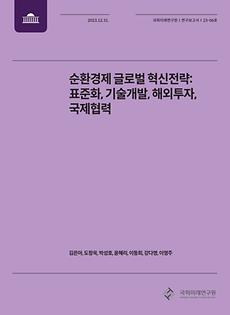
In response to a global compound crisis, the circular economy model, emphasizing the efficient use of resources, has emerged as a key alternative economic model replacing the traditional linear economy. Resource- deficient nations like South Korea recognize the importance of a circular economy strategy for stable resource supply. The significance also encompasses policies for green transition and the development of new growth engines. However, the current domestic policies on the circular economy are missing a comprehensive global innovation strategy, and they lack medium to long-term investment strategies for technological and industrial development. This study aims to identify vulnerabilities and opportunities by analyzing global policy/initiative trends, the status of technological development, and key drivers of the foreign direct investment.
The analysis reveals domestic vulnerabilities such as a) insufficient participation in international standardization discussions, b) fragmented policy governance of standardization institutions, c) lack of specific guidelines and institutional support for sustainable finance and green investment, d) insufficient participation and leadership in global initiatives, e) low influence in global intellectual property networks, f) limited target industries for foreign direct investment, and g) uncertainty in overseas investment strategies. On the other hand, identified opportunities include A) establishing new global leadership by setting ESG investment standards, B) enhancing domestic industries’ export competitiveness through timely responses to international standards, C) expanding overseas networks via active participation in global circular economy initiatives, D) improving national competitiveness through technological development and innovation in the circular economy, and E) exploring opportunities for overseas market expansion and supply chain stabilization through foreign direct investment in advanced technologies. Based on these results, we derived implications for policy intervention and global innovative strategies in the areas of 1) International Standardization and Certification, 2) Technology Development, 3) Foreign Investment, 4) International Cooperation.